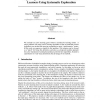1817 search results - page 27 / 364 » Extensive Games as Process Models |
147
click to vote
INFOCOM
2008
IEEE
15 years 9 months ago
2008
IEEE
—We consider a scenario in which users share an access point and are mainly interested in VoIP applications. Each user is allowed to adapt to varying network conditions by choosi...
130
click to vote
IAT
2009
IEEE
15 years 9 days ago
2009
IEEE
Patrolling environments by means of autonomous mobile robots has received an increasing attention in the last few years. The interest of the agent community is mainly in the develo...
108
Voted
PRL
2008
15 years 2 months ago
2008
We consider an active learning game within a transductive learning model. A major problem with many active learning algorithms is that an unreliable current hypothesis can mislead...
125
click to vote
ICC
2007
IEEE
15 years 8 months ago
2007
IEEE
— The paper is concerned with a novel adaptive game server protocol optimization to combat network latencies in the case of heterogeneous network environment. In this way, game p...
114
click to vote
ESORICS
2007
Springer
15 years 8 months ago
2007
Springer
Current trust models enable decision support at an implicit level by means of thresholds or constraint satisfiability. Decision support is mostly included only for a single binary...

